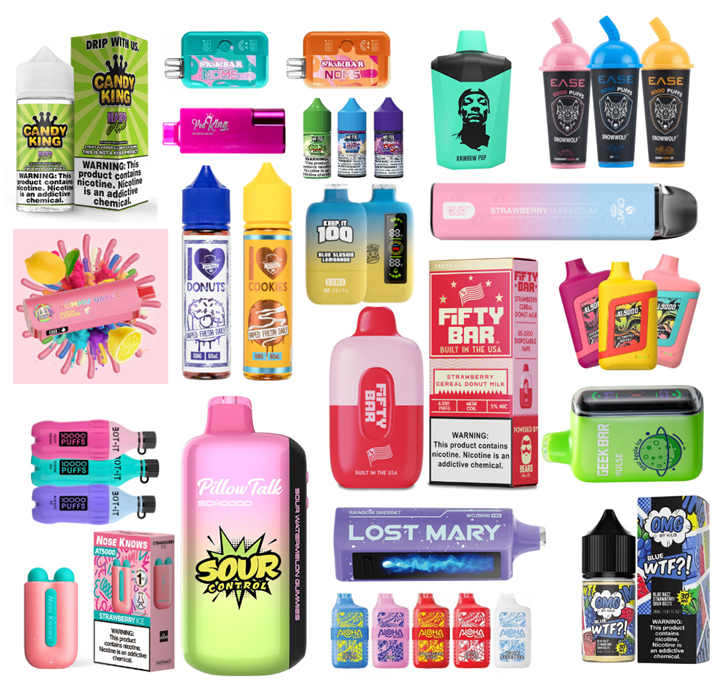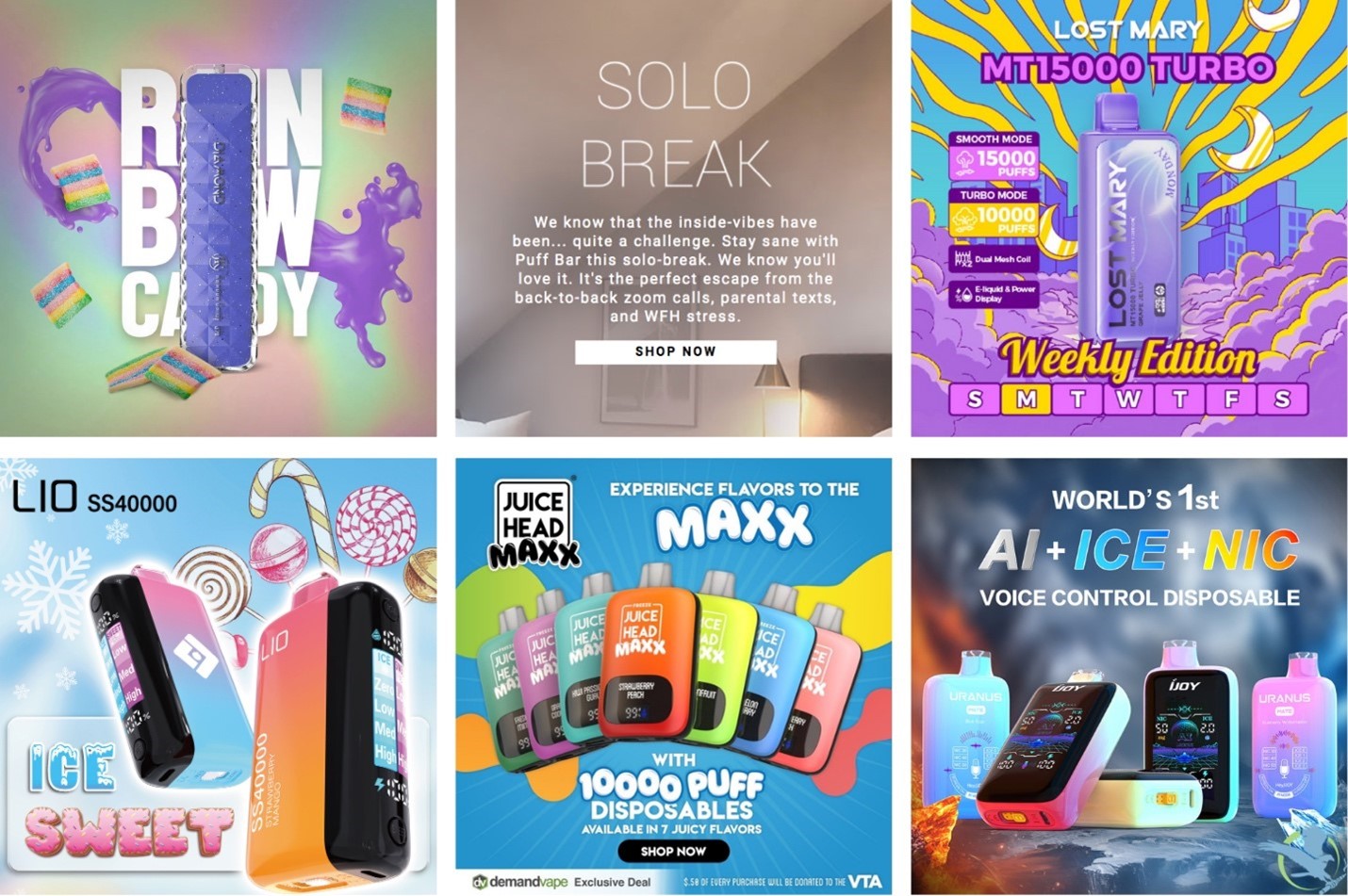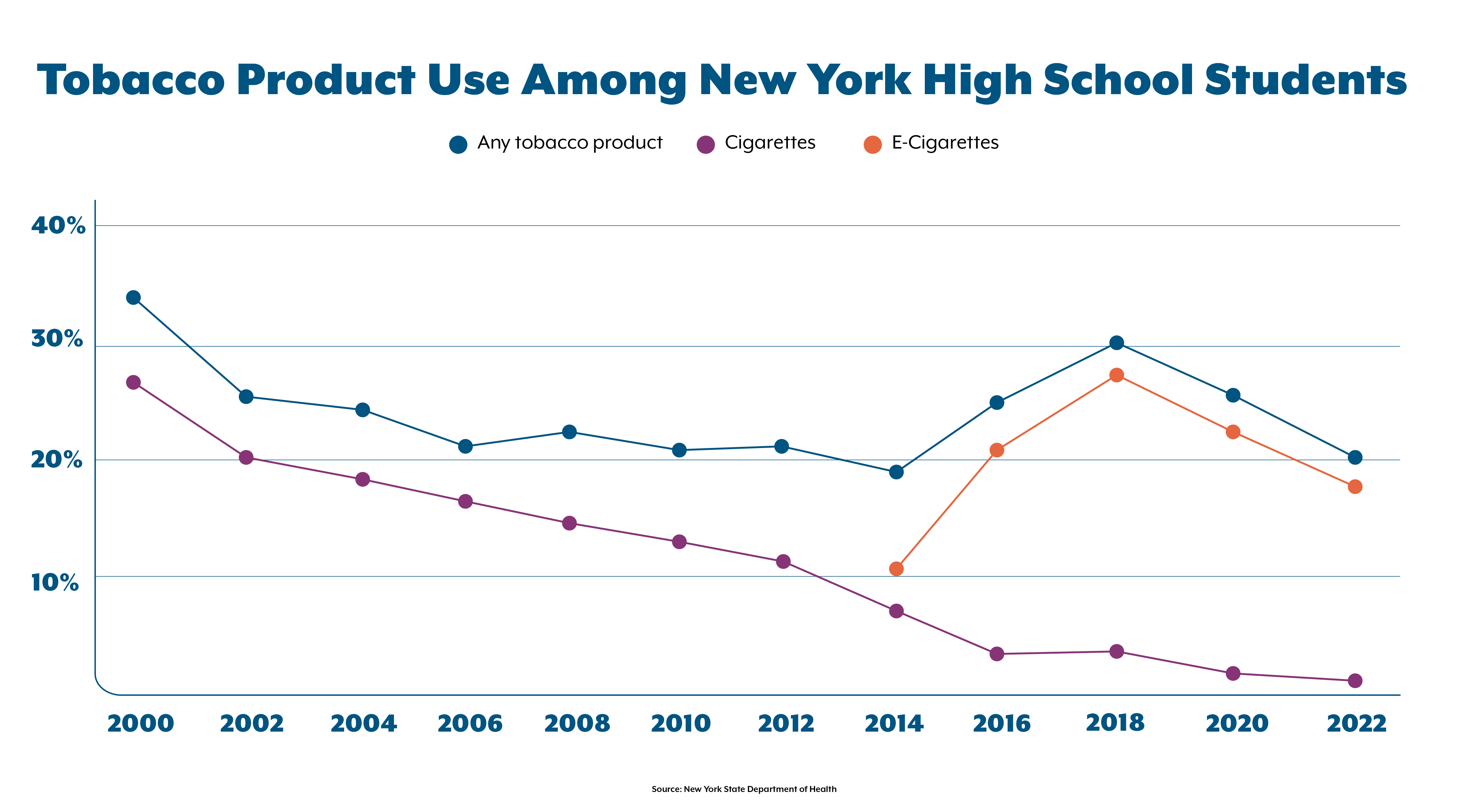NYSAG Sues Vape Companies
Per the notice below, the New York State Attorney General (NYSAG) has filed a lawsuit against major vape companies for fueling a youth vaping epidemic.
Attorney General James Sues Nation’s Largest Vape Distributors for Fueling the Youth Vaping Epidemic
Companies Intentionally Marketed Vaping Products to Children Despite Knowledge of Health Risks; Misled Consumers About Safety and Legality of Vaping
AG James Seeks Hundreds of Millions of Dollars for Damages, Penalties, Disgorgement, and Vaping Abatement Fund
New York Attorney General Letitia James today announced a lawsuit against 13 major e-cigarette, or “vape,” manufacturers, distributors, and retailers for their role in fueling the youth vaping epidemic. These companies are responsible for illegally distributing, marketing, and selling flavored disposable vapes – including popular brands such as Puff Bar, Elf Bar, Geek Bar, Breeze, MYLE, and more – which have become extraordinarily popular among minors. An Office of the Attorney General (OAG) investigation found that these companies market highly addictive, candy- and fruit-flavored nicotine products to underage consumers, mislead customers about the safety and legality of their products, illegally ship products to New York, and violate health regulations designed to curb youth vaping. With this action, Attorney General James is holding the nation’s leading vape distributors accountable for their role in this public health crisis. The landmark lawsuit seeks hundreds of millions of dollars, including financial penalties for wide-ranging violations of local, state, and federal laws; damages and restitution for the public health impact of the companies’ illegal actions; the recovery of all revenue made from unlawful activity; and the establishment of an abatement fund to address the youth vaping crisis in New York.
“The vaping industry is taking a page out of Big Tobacco’s playbook: they’re making nicotine seem cool, getting kids hooked, and creating a massive public health crisis in the process,” said Attorney General James. “For too long, these companies have disregarded our laws in order to profit off of our young people, but we will not risk the health and safety of our kids. Today, we are taking critical steps toward holding these companies accountable for the harm they have caused New Yorkers.”
The vaping industry has adopted deceptive, inescapable marketing strategies that are reminiscent of the tactics that made the tobacco industry infamous. Vaping companies directly target youth with bright, colorful packaging, candy and fruit flavors, social media and influencer campaigns, and unproven claims that their products are “safe” alternatives to cigarettes. The vape products the defendants often help develop, design, and even taste-test are intended to attract young people, with eye-catching, cartoonish packaging and flavors like “Blue Razz Slushy,” “Sour Watermelon Patch,” “Unicorn Cake,” “Fruity Bears Freeze,” “Cotton Candy,” “Rainbow Rapper,” “Sour Fruity Worms,” “Fruity Pebbles,” and “Strawberry Cereal Donut Milk,” to entice kids.

Vape companies use bright, colorful packaging and candy and fruit flavors to entice children.
The OAG investigation found that these companies often rely on social media in their marketing and ensure their vapes are abundantly available within walking distance of schools in an effort to reach young consumers. The companies also make use of celebrity or influencer endorsements, sponsor brand activations and social media photo opportunities at popular festivals and events, and promote dangerous vaping trends and challenges to drive engagement online. One company, Puff Bar, ran a social media advertisement during the early days of the pandemic lockdown that billed their vapes as “the perfect escape from back-to-back zoom calls [and] parental texts.”

Vaping advertisements feature bright colors and candy, as well as illegal discounts and relatable language to attract kids.
The investigation also revealed that vape companies have long been aware that their products pose health risks to users – and are particularly harmful to youth – but have continued to target young people with deceptive and misleading messages about the products’ safety. In particular, the companies’ advertisements often position vaping products as a safer, healthier alternative to cigarettes. One of the defendants has even advanced conspiracy theories in an attempt to brush away concerns over the safety of vaping, repeatedly pushing the idea that state governments were campaigning to crush vaping in an attempt to boost tobacco sales for financial gain. In addition, despite knowing that New York banned the sale of flavored vapor products in 2020, the companies have continued to sell these products while intentionally misleading customers about the legality of the sales. None of the companies named in the lawsuit have received authorization from the U.S. Food and Drug Administration (FDA) for their fruit – or – candy flavored vapes, making their sale illegal under federal law. Attorney General James’ lawsuit alleges the companies have knowingly and intentionally ignored FDA warning letters and regulations, as well as the federal Prevent All Cigarette Trafficking (PACT) Act, which prohibits online sales of vaping products to consumers and unlicensed retailers. In addition to violating federal bans on shipping these products, the companies fail to register with the appropriate authorities, verify recipients’ ages, or follow any other shipping restrictions.
Attorney General James also alleges that these vape companies have blatantly disregarded New York state public health laws, including several policies enacted in recent years to curb youth vaping. In 2020, New York banned the sale of flavored vapor products, restricted the shipment and transport of nicotine products, and raised the legal purchase age for all vapes to 21. The state also banned coupons and discounts on vapes, and began requiring certain companies to disclose dangerous ingredients in their vapes. The vape companies named in this lawsuit have repeatedly and knowingly violated these laws. The OAG investigation uncovered widespread evidence of this illegal conduct, including documents showing illegal shipments of flavored vapes to New York residential addresses, communications demonstrating companies’ knowledge of health and legal risks, and company advertisements and social media campaigns that misleadingly promoted vapes as safe and fun. The rise in youth vaping has reversed years of progress in reducing tobacco and nicotine use among adolescents. According to the New York State Department of Health (DOH), e-cigarette use among high school students has skyrocketed over the past decade, with flavored vapes being the most commonly used tobacco and nicotine product among youth. Attorney General James’ lawsuit highlights the severe health risks associated with vaping, including nicotine addiction, respiratory issues, and long-term cognitive impairments. According to the American Lung Association, some vape ingredients have been found to cause irreversible lung damage, while nicotine exposure during adolescence can permanently alter brain development. Kids who use nicotine products are also at increased risk for future addiction to other drugs.

The rapid rise popularity of vaping among teenagers reversed years of progress in reducing youth nicotine use.
For their illegal conduct and role in fueling the youth vaping crisis, Attorney General James is seeking broad relief from the companies, including a permanent ban on selling flavored vapes in New York, significant financial penalties and restitution for harm caused to New Yorkers, public corrective statements to inform consumers of the dangers of vaping, and the creation of an abatement fund to address and mitigate the effects of the public health crisis these companies helped create. In addition, OAG is pursuing total disgorgement of all revenues earned as a result of illegal activity. In total, Attorney General James is seeking hundreds of millions of dollars in financial compensation for the havoc these companies’ products and marketing have wreaked on New York’s kids and their health and well-being.
The manufacturers, distributors, and retailers named in the lawsuit are Puff Bar, MYLE Vape, Pod Juice, Mi-One Brands, Happy Distro, Demand Vape, EVO Brands, PVG2, Magellan Technology, Midwest Goods, Safa Goods, EVO Brands, and Price Point Distributors, as well as Price Point principals Weis Khwaja, Hamza Jalili, and Mohammad Jalili.
“These predatory companies purposefully preyed on our classmates and peers, irreparably damaging our lives,” said Erin Kennedy, founder of anti-vaping advocacy group at East Hampton High School and a frontline witness to the second youth nicotine epidemic. “Therapeutic tools are the only useful actions to try to help the second wave of youth nicotine addiction. Money received from lawsuits with vaping companies must be funneled to therapeutic treatments to try and undo the harm, even death, created by these exploitative companies.”
“I thank Attorney General James for her significant financial commitment to Suffolk County to hopefully invest in community-based therapeutic treatments for my friends and classmates who have been poisoned and now struggle with nicotine addiction,” said Samantha Price, founder of anti-vaping advocacy group at East Hampton High School and a frontline witness to the second youth nicotine epidemic.
“Vaping continues to be a public health issue for teens and young adults and has been exacerbated by irresponsible marketing strategies,” said Dr. Susan Gasparino, Medical Director of the Clinical and Community-Based Programs at the Center for Community Health & Prevention at the University of Rochester Medical Center. “I applaud and sincerely thank Attorney General Letitia James for, once again, taking action to hold these companies accountable. Her efforts, paired with the counseling and educational services like those we provide at our Center’s clinic, are what it takes to see change and advocate for the health of our young people.”
“Parents Against Vaping is enormously grateful to New York’s Attorney General Letitia James and her team for their ongoing commitment to and leadership in the fight to protect kids from a predatory industry that seeks to addict an entire generation to nicotine,” said Meredith Berkman, Co-Founder of Parents Against Vaping. “By going after those who deliberately market, promote, and peddle illegal flavored vapes to minors, causing serious negative health consequences that can impact young people for years to come, the Attorney General makes clear that she will not allow these bad actors to continue making enormous profits while harming New York’s children.”
“The vaping industry has taken advantage of youth as a vulnerable and profitable market through flavoring, advertising, and sales techniques, putting their health at risk,” said Melissa Safford, Program Director of Uplift Irondequoit. “Our coalition and community work hard to promote prevention amid a market that is flooded with false claims surrounding the safety and benefits of vaping. It is wonderful to see that Attorney General James is continuing to be a champion for youth's health, protecting them from the vaping industry.”
“The Long Island Council on Alcoholism and Drug Dependence (LICADD) offers our professional support to the continued leadership by our New York State Attorney General Letitia James in her unwavering efforts to keep New Yorkers safe from unscrupulous marketing strategies flagrantly targeting our youth and exposing them to dangerous and addictive nicotine products,” said Steve Chassman, Executive Director of LICADD. “Nicotine is a potent mind- and mood-altering drug that potentially develops into a physical and psychological dependence. The implications of nicotine intoxication and dependence for young people on their mental, physical, academic, and social well-being are far reaching when dangerous levels of nicotine are consumed at a vulnerable age. These dangerous products are being callously marketed as ‘candy-like’ materials, distorting the harmful effects the drug has on human development. LICADD commends Attorney General Letitia James for fighting for the health and wellness of our youth who are potentially falling prey to monetary greed and a total disregard of public health.”
This lawsuit builds on Attorney General James’ efforts to hold the vaping industry accountable. Last month, Attorney General James filed a lawsuit against a retailer in upstate New York for knowingly selling vapor products to underage customers. In April 2023, Attorney General James secured $462 million from Juul Manufacturers for its role in the youth vaping epidemic. In August 2021, Attorney General James co-led a bipartisan coalition calling on the FDA to regulate e-cigarettes and oral nicotine products. In December 2020, Attorney General James ordered dozens of retailers across the state to immediately stop selling e-cigarette products to underage customers and to stop selling flavored vaping products in violation of New York state law. Also in December 2020, Attorney General James held a roundtable with elected officials, students, and parents on the subject of vaping among young people in New York state. In July 2020, Attorney General James cracked down on three online retailers that were illegally selling e-cigarettes online to consumers in New York, including minors. In April 2019, Attorney General James led a coalition of seven states in urging the Food and Drug Administration (FDA) to take stronger action in addressing the scourge of e-cigarette use among youth by taking proposed measures such as strengthening guidance, beginning enforcement earlier, and banning online sales of e-cigarettes.
This matter is being handled by Special Counsel Monica Hanna with assistance from Health Care Deputy Bureau Chief Leslieann Cachola, Special Counsel for Complex Litigation Colleen Faherty, Assistant Attorneys General Alex Finkelstein, Wil Handley, and Joy Mele, Legal Assistants Ketty Dautruche and Dana-Ann Henry, and Document Review Managers Carol Cheng and Kristin Petrella, under the supervision of Health Care Bureau Chief Darsana Srinivasan. Data analysis was provided by Data Scientist Blythe Davis under the supervision of Deputy Director Gautam Sisodia and Director Victoria Khan of the Research and Analytics Department. The Health Care Bureau is part of the Division of Social Justice which is led by Chief Deputy Attorney General Meghan Faux and overseen by First Deputy Attorney General Jennifer Levy.

